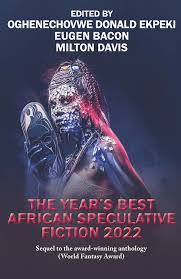The Rise of African Speculative Fiction
African speculative fiction, encompassing genres such as science fiction, fantasy, and horror, has been experiencing a remarkable surge in popularity and recognition in recent years. With a rich tapestry of diverse cultures, histories, and traditions, Africa provides a fertile ground for imaginative storytelling that captivates audiences worldwide.
Diverse Voices and Perspectives
One of the defining features of African speculative fiction is the diverse range of voices and perspectives it encompasses. From Afrofuturism that reimagines African futures to folklore-inspired fantasy worlds and chilling horror tales rooted in local myths, African authors are reshaping the literary landscape with their unique storytelling styles.
Exploring Identity and History
Through speculative fiction, African writers have found a powerful medium to explore themes of identity, history, and social issues. By blending fantastical elements with real-world challenges faced by the continent, these authors offer insightful commentary on contemporary issues while celebrating Africa’s rich cultural heritage.
A Global Audience
The growing popularity of African speculative fiction has not gone unnoticed on the global stage. Works by authors such as Nnedi Okorafor, Tade Thompson, and Tomi Adeyemi have garnered critical acclaim and attracted readers from diverse backgrounds who are eager to explore new worlds and narratives.
The Future of African Speculative Fiction
As African speculative fiction continues to evolve and gain recognition, it holds immense potential for further growth and innovation. With emerging talents pushing boundaries and established authors paving the way for future generations, the future looks bright for this vibrant literary genre that celebrates Africa’s creativity and imagination.
Exploring the Rich Tapestry of African Speculative Fiction: Celebrating Diversity, Empowerment, and Imagination
- Showcases diverse African cultures and traditions in imaginative settings.
- Offers fresh perspectives on social issues through fantastical storytelling.
- Empowers African voices in the global literary landscape.
- Explores complex themes of identity, history, and futurism with creativity.
- Inspires readers with rich narratives that blend folklore and futuristic elements.
- Promotes inclusivity by highlighting underrepresented stories and characters.
Challenges Facing African Speculative Fiction: Recognition, Representation, and Resources
- Limited mainstream recognition compared to Western speculative fiction.
- Challenges in distribution and accessibility of African speculative fiction works.
- Underrepresentation of certain African cultures or regions within the genre.
- Struggles with funding and resources for emerging African speculative fiction authors.
- Perceived language barriers for non-English speaking African authors to reach wider audiences.
- Potential cultural misinterpretations or stereotypes in cross-cultural depictions within the genre.
- Lack of established infrastructure and platforms for promoting and supporting African speculative fiction.
Showcases diverse African cultures and traditions in imaginative settings.
African speculative fiction shines brightly in its ability to showcase the rich tapestry of diverse African cultures and traditions within imaginative and fantastical settings. Through the genre’s creative storytelling, readers are transported to worlds where ancient folklore, rituals, and beliefs intertwine seamlessly with futuristic technology or magical realms. This unique fusion not only offers a fresh perspective on African heritage but also celebrates the continent’s cultural richness in ways that captivate and inspire audiences around the globe.
Offers fresh perspectives on social issues through fantastical storytelling.
African speculative fiction offers a refreshing approach to addressing social issues by weaving them into fantastical narratives. By blending elements of fantasy, science fiction, and horror with real-world challenges, African authors provide readers with new lenses through which to explore and understand complex societal issues. This innovative storytelling technique not only captivates audiences but also encourages deeper reflection on pressing social concerns, offering a unique and engaging platform for discussing and reimagining the world we live in.
Empowers African voices in the global literary landscape.
African speculative fiction serves as a powerful platform that empowers African voices within the global literary landscape. By showcasing diverse narratives, perspectives, and experiences rooted in African culture and traditions, this genre not only amplifies the voices of African writers but also challenges traditional Western-centric storytelling norms. Through their imaginative works, African authors are reclaiming their narratives and reshaping the literary conversation on a global scale, contributing to a more inclusive and representative portrayal of the rich tapestry of stories from the continent.
Explores complex themes of identity, history, and futurism with creativity.
African speculative fiction stands out for its ability to delve into intricate themes of identity, history, and futurism with unparalleled creativity. Through imaginative storytelling, African authors skillfully weave together elements of the past, present, and future to offer profound insights into the complexities of personal and cultural identities, the impact of history on contemporary society, and visions of possible futures. This genre not only entertains but also challenges readers to reflect on their own perspectives and assumptions, making it a powerful tool for exploring the multifaceted layers of human experience.
Inspires readers with rich narratives that blend folklore and futuristic elements.
African speculative fiction stands out for its ability to inspire readers with rich narratives that seamlessly blend traditional folklore with futuristic elements. By weaving together age-old myths and cutting-edge technologies, African authors create immersive worlds that not only entertain but also challenge readers to think beyond the boundaries of conventional storytelling. This unique fusion of past and future in African speculative fiction offers a fresh perspective on the genre, enriching the literary landscape with diverse voices and imaginative storytelling that captivates audiences around the globe.
Promotes inclusivity by highlighting underrepresented stories and characters.
African speculative fiction excels in promoting inclusivity by shining a spotlight on underrepresented stories and characters. Through its diverse narratives and rich tapestry of cultures, the genre offers a platform for voices that have traditionally been overlooked or sidelined in mainstream literature. By featuring protagonists from varied backgrounds and exploring themes of identity and representation, African speculative fiction fosters a sense of belonging and empowerment among readers who see themselves reflected in the stories told. This emphasis on inclusivity not only enriches the genre but also contributes to a more diverse and representative literary landscape overall.
Limited mainstream recognition compared to Western speculative fiction.
In the realm of African speculative fiction, a notable challenge lies in its limited mainstream recognition when compared to Western speculative fiction. Despite the wealth of talent and creativity present in African authors and their works, the genre often struggles to gain the same level of visibility and acclaim as its Western counterparts. This disparity in recognition not only hinders the exposure of African speculative fiction to a wider audience but also perpetuates a narrative that overlooks the rich storytelling traditions and diverse perspectives that Africa has to offer. Efforts to bridge this gap and elevate African speculative fiction onto a more prominent platform are crucial in fostering greater appreciation for the genre’s unique voices and narratives.
Challenges in distribution and accessibility of African speculative fiction works.
The distribution and accessibility of African speculative fiction works pose significant challenges within the literary landscape. Despite the growing interest in these narratives, many works struggle to reach a wider audience due to limited distribution channels and visibility in mainstream markets. This lack of accessibility not only hinders the exposure of talented African authors but also restricts readers worldwide from experiencing the richness and diversity of African speculative fiction. Addressing these challenges is crucial to ensuring that these unique voices are heard and celebrated on a global scale, fostering greater inclusivity and appreciation for the genre.
Underrepresentation of certain African cultures or regions within the genre.
The underrepresentation of certain African cultures or regions within the genre of African speculative fiction is a significant challenge that hinders the diversity and richness of storytelling in this vibrant literary landscape. While some parts of Africa have gained visibility through works by renowned authors, there remains a vast array of cultures and traditions waiting to be explored and celebrated through speculative fiction. By overlooking these lesser-known regions, the genre misses out on the opportunity to showcase the full spectrum of African creativity and imagination, limiting the depth and breadth of narratives that could emerge from these diverse cultural tapestries. Efforts to amplify voices from underrepresented African cultures are essential to fostering a more inclusive and representative portrayal of the continent’s storytelling heritage within the realm of speculative fiction.
Struggles with funding and resources for emerging African speculative fiction authors.
In the realm of African speculative fiction, emerging authors often face significant challenges when it comes to securing funding and resources for their creative endeavours. Limited access to financial support, publishing opportunities, and mentorship programmes can hinder the growth and visibility of talented writers within the genre. Despite the wealth of imaginative storytelling within African speculative fiction, the lack of adequate resources poses a barrier for aspiring authors looking to share their unique perspectives and narratives with a wider audience. Efforts to address these funding disparities are crucial in nurturing a diverse and thriving literary landscape that amplifies the voices of emerging African speculative fiction authors.
Perceived language barriers for non-English speaking African authors to reach wider audiences.
Language barriers present a significant challenge for non-English speaking African authors in the realm of speculative fiction. While the genre is gaining momentum globally, authors who write in languages other than English often face difficulties in reaching wider audiences beyond their linguistic communities. The perceived dominance of English as the primary language for international literary consumption can limit the visibility and accessibility of diverse voices and narratives originating from Africa. Overcoming these language barriers is crucial to ensuring that a more comprehensive range of African speculative fiction can be appreciated and celebrated on a broader scale, allowing for greater cultural exchange and representation within the genre.
Potential cultural misinterpretations or stereotypes in cross-cultural depictions within the genre.
In the realm of African speculative fiction, a notable concern arises from the potential for cultural misinterpretations or perpetuation of stereotypes in cross-cultural depictions within the genre. As authors navigate the fusion of traditional African elements with speculative themes, there is a delicate balance to strike between authenticity and avoiding harmful portrayals. Careful consideration must be given to representation, ensuring that diverse cultures are depicted respectfully and accurately without falling into clichés or misconceptions. By addressing these challenges thoughtfully, writers can contribute to a more nuanced and inclusive portrayal of African narratives in speculative fiction, fostering greater understanding and appreciation across cultural boundaries.
Lack of established infrastructure and platforms for promoting and supporting African speculative fiction.
The lack of established infrastructure and platforms for promoting and supporting African speculative fiction poses a significant challenge to the growth and recognition of the genre. Without dedicated spaces for showcasing African speculative works, talented authors often struggle to reach wider audiences and connect with readers who appreciate their unique storytelling. The absence of robust support systems also hinders the development of emerging writers and limits opportunities for collaboration and networking within the African speculative fiction community. Addressing this issue is crucial in nurturing creativity, fostering talent, and ensuring that African voices in speculative fiction are heard and celebrated on a global scale.




